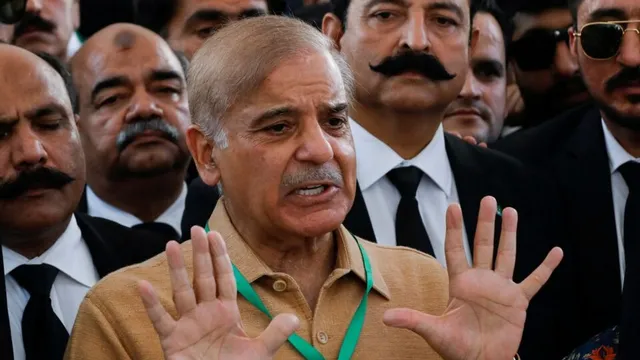- By Supratik Das
- Sat, 17 May 2025 08:06 AM (IST)
- Source:JND
Pakistan Prime Minister Shehbaz Sharif acknowledged that Indian ballistic missiles hit the Nur Khan Airbase and several other targets on May 10. This is a rare acknowledgement, breaking its persistent denial policy. Sharif announced this in a public speech at the Pakistan Monument, declaring that Army Chief General Asim Munir had briefed him over a secure line at 2:30 am on the strikes.
Sharif said, "At around 2:30 am on May 10, General Syed Asim Munir called me on secure line and informed me that India's ballistic missiles have hit Nur Khan Airbase and other areas. Our Air Force used homegrown technology to save our country, and they even used modern gadgets and technology on Chinese jets," Geo News reported. He added that Pakistan’s Air Force had used locally developed technology and Chinese jets in a defensive response, but acknowledged the precision of India’s missile strikes.
BJP leader Amit Malviya tweeted a post highlighting the strategic depth of the Indian operation. "Pakistan PM Shehbaz Sharif himself admits that General Asim Munir called him at 2:30 am to tell him India had bombed Nur Khan Air Base and some other places… This says volumes about the scale, accuracy, and audacity of #OperationSindoor," Malviya posted.
Pakistan PM Shehbaz Sharif himself admits that General Asim Munir called him at 2:30am to inform him that India had bombed Nur Khan Air Base and several other locations. Let that sink in — the Prime Minister was woken up in the middle of the night with news of strikes deep inside… pic.twitter.com/b4QbsF7xJh
— Amit Malviya (@amitmalviya) May 16, 2025
Operation Sindoor: Response to Terrorism
India initiated Operation Sindoor in the pre-dawn hours of May 7 as a measured military reaction to the Pahalgam terror attack, which was pinned on Pakistan-sponsored terror outfits such as Jaish-e-Mohammed (JeM), Lashkar-e-Taiba (LeT), and Hizbul Mujahideen (HM). The Indian military struck at least nine terror locations in Pakistan and Pakistan-occupied Jammu and Kashmir (PoJK), killing more than 100 terrorists.
Following India’s airstrikes, Pakistan retaliated with cross-border shelling and attempted drone incursions along the LoC and border regions in Jammu and Kashmir. India responded swiftly, launching further strikes on Pakistani airfields. After days of military escalation, a ceasefire agreement was achieved on May 10 between the two nuclear-armed neighbours. PM Shehbaz Sharif, in the aftermath, conveyed Pakistan's readiness to negotiate with India. "Pakistan is ready for peace dialogue with India, but it should contain the Kashmir issue," Sharif said upon a visit to Kamra Airbase, The Express Tribune reported. But India has again made it clear that any talks will be strictly confined to terrorism and PoJK. Prime Minister Narendra Modi, in a speech after the success of Operation Sindoor, made India's stand on talks with Pakistan clear. "If there are talks with Pakistan, it will be only on terrorism; and only on PoJK," PMModi stated. He also cautioned Islamabad that going on supporting terrorism would eventually be Pakistan's demise. "If Pakistan is to survive, it has to dismantle its terror infrastructure. There is no other way to peace," he said.
There are ongoing tensions between India and Pakistan after the April and May events. Although both countries have committed to stopping further military operations, the situation remains tense. The international community is taking a close watch, particularly in the wake of Pakistan's unusual public admission of Indian missile attacks.

